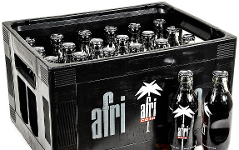Ambev
Ambev Reports Mixed Third Quarter Results, Sales Lag Expectations
Ambev reported third-quarter earnings per share of 4 cents, matching analyst expectations, while sales of $3.983 billion fell short of the $4.082 billion forecast. Consolidated volumes declined 0.6 percent, but excluding Argentina, volumes grew 1.3 percent. In Brazil, total volumes rose 1.3 percent, with strong gains in premium beer brands like Corona and Budweiser. Central America and the Caribbean volumes decreased slightly. Looking ahead, Ambev plans to continue focusing on its commercial strategy, anticipating stronger demand in South America’s upcoming summer season.
Asahi
Asahi UK Reports Loss Amid Competitive Beer Market Challenges
Asahi’s UK arm reported a pre-tax loss of £14 million for 2023, a sharp decline from its £6.4 million loss in the prior year. It was attributed to economic pressures impacting production and distribution, alongside increased competition in the alcoholic beverage sector, especially from craft breweries. Asahi aims to expand its market share in the UK by offering a portfolio of premium domestic and international drinks.
Brands
Suntory Launches Premium Canned Highball With Yamazaki Whisky
Suntory is releasing a new premium canned highball featuring its prized single malt Yamazaki whisky. Unlike traditional canned cocktails, often seen as low-quality, this drink uses Yamazaki whisky from Suntory’s historic distillery, Japan’s first malt whisky distillery. The new version, called Suntory Premium Highball Yamazaki-Bright and Rich Flavor, is aged in Spanish oak barrels, enhancing its taste beyond the previous limited-edition version aged in Quercus oak. Priced at 600 yen (US$4.30) with 9% alcohol, this highball is both stronger and more costly than typical canned cocktails. Set for release on December 24 in limited quantities, the highball aims to elevate the canned cocktail experience.
Carlsberg
Carlsberg Adjusts Marketing Focus Amid Premium Sales Slowdown
Carlsberg reported a 1.3 percent drop in beer volumes for the third quarter of 2023, with sales in premium categories falling 0.5 percent in key markets like China, France and the UK. CEO Jacob Aarup-Andersen noted economic pressures led consumers to buy less beer and favor of more affordable options. In response, Carlsberg is shifting some marketing efforts from premium brands to more mainstream offerings. Despite the current slowdown, Aarup-Andersen remains confident in the long-term growth of premium brands. Carlsberg’s sales increased 1 percent to 20.5 billion Danish crowns, below expectations. The company still anticipates achieving 4-6 percent organic operating profit growth for the year despite market challenges.
Carlsberg Pledges Regenerative Farming For Sustainable Beer By 2040
Carlsberg Group committed to sourcing all grains from regenerative farming by 2040, reducing Carlsberg’s environmental impact while enhancing ingredient resilience and flavor profiles. Carlsberg is also partnering with World Wildlife Fund to restore wetlands in Asia, where water insecurity poses a significant challenge.
Companies
Varun Beverages Secures Approval For Bevco Acquisition
The Competition Commission approved Varun Beverages' acquisition of The Beverage Company (Bevco) in South Africa after setting conditions to protect local interests and prevent job losses. Varun Beverages committed to five years of capital investment, expanding local procurement and installing more fridge coolers at retail outlets. It also plans to introduce an owner-driver program and a worker share ownership scheme to empower employees. Bevco, a key producer of soft drinks and energy beverages in South Africa, will continue to provide popular Pepsi products and expand its reach through Varun's global expertise and resources.
Lotte
Lotte Chilsung Drives Growth With Global Expansion
Lotte Chilsung Beverage is on track for significant sales growth, driven by strong international performance. Lotte Chilsung aims to surpass 4 trillion won in sales this year, fueled by its acquisition of Pepsi Philippines, which added nearly 1 trillion won in revenue. The Philippines, with its young, large population and high demand for carbonated drinks, is a key growth market. Sales in the first half of the year crept just over 2 trillion won and the company expects 40 percent of its sales this year to come from overseas.
RJ Corp
Varun Beverages Reports Strong Q3 Profit Driven By Global Demand
Varun Beverages reported a strong third-quarter net profit, exceeding expectations with a nearly 24 percent rise to 6.20 billion rupees. While unusually high monsoon rains dampened out-of-home beverage consumption in India, leading to slower domestic growth (5.7 percent), demand in international markets, especially in Africa, bolstered overall performance. The company’s sales volume increased by 22 percent, helped by contributions from its recent Bevco acquisition in South Africa, and revenue from operations rose 25 percent.
Varun Beverages Invests $50M In New Pepsi Plant in DRC
Varun Beverages, part of India’s RJ Corp, is investing $50 million to establish a Pepsi production facility in the Democratic Republic of the Congo, in Kiswishi, a special economic zone near Lubumbashi. The 15-hectare plant is expected to create thousands of jobs and support regional economic development through enhanced logistical efficiencies. This facility will help meet the rising demand for Pepsi products in the DRC and is a key part of Varun’s growth strategy in Africa. Varun Beverages, a PepsiCo franchisee since the 1990s, has expanded across Africa, with operations in countries including Morocco, Zambia and Zimbabwe.
Suntory
Suntory CEO Reflects On Global Growth And Market Trends
Takeshi Niinami, CEO of Suntory Holdings, celebrates a decade at the helm of the Japanese beverage group, where he has overseen Suntory's expansion into a global powerhouse in premium spirits. Key milestones include the acquisition and integration of Beam, advancing Suntory’s global presence and adapting its products to shifting consumer trends, such as ready-to-drink options for younger, health-conscious customers. Niinami emphasizes Suntory’s commitment to authenticity and quality, particularly in Japanese whisky. He also discusses Suntory's approach to navigating global trade issues through local production and efficient operations. With Japan’s evolving economy and labor needs, Niinami supports strategies for sustainable growth, including productivity improvements and immigration, to counter Japan’s declining population.
Copyright 2026 Business360, Inc.

